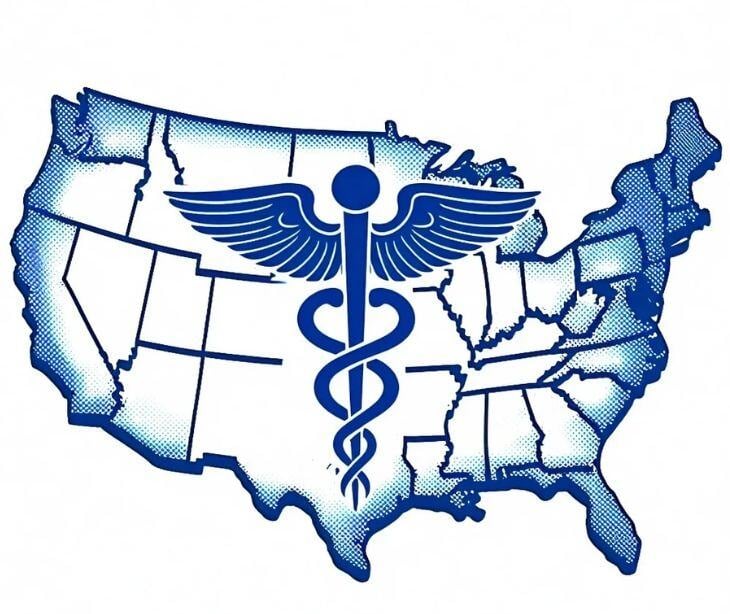3 min read
US healthcare trends, challenges, and strategies for 2025
Caitlin Anthoney Feb 13, 2025 11:08:58 AM

Healthcare organizations and insurers must prepare for a year of major changes driven by political shifts, regulatory changes, and digital transformation.
Policy shifts under the Trump administration
With Trump returning to office, his administration is expected to focus on "protecting Medicare and targeting the high cost of some drugs," according to Deloitte’s healthcare industry insights for 2025.
Policies addressing "surprise medical billing, price transparency, and out-of-pocket costs for consumers" remain on the table, with potential regulatory shifts through budget reconciliation.
In the early days of the new administration, bipartisan-supported initiatives like "pharmacy benefit managers regulations, site-neutral payment policies, and drug-pricing limits under the Inflation Reduction Act" will take precedence.
Additionally, Trump has "been vocal about granting states’ oversight of reproductive-health decisions," which could have major implications for healthcare providers and insurers.
Healthcare organizations should:
- Monitor presidential appointees within the Department of Health and Human Services and the Centers for Medicare and Medicaid Services for insights on their health policies.
- Evaluate the potential impact of Senate and House of Representatives control on health policy.
- Develop better plans for compliance with federal, state, and municipal regulations.
Diverging priorities for health plans and systems
Health plans and health systems are approaching 2025 with very different strategies. According to Deloitte, "Most health plans are primarily focused on adopting transformative technologies, including gen AI."
On the other hand, "health systems [will strengthen] their core legacy business technologies rather than investing heavily in digital tools and transformative technologies."
While health plans must "navigate regulatory uncertainty," health systems face more pressing workforce issues, including talent shortages and burnout. Despite their differing approaches, these sectors must use technology to improve efficiency and patient outcomes.
Health plans and regulatory compliance
Regulatory changes are a major concern for many health plans, with "nearly 60% of health plan respondents [expecting] that recent and upcoming regulatory changes will influence their organizational strategies in 2025."
Major regulatory issues include:
- Medicare prescription price discussions under the Inflation Reduction Act.
- Modifications to Medicare Advantage payment rates.
- Stricter guidelines for mental health parity.
- The 2025 Notice of Benefit and Payment Parameters.
Health plans and AI
To stay competitive, many health plans are integrating generative AI (gen AI). Deloitte states, "Sixty percent of health plan respondents anticipate the adoption of digital technology to accelerate in 2025," and "58% identified AI and automation" as top trends to watch.
AI applications are already enhancing "claims processing, underwriting, personalized treatment plans, fraud detection, and document extraction."
Consequently, we should see health plans:
- Strengthen governance through interdisciplinary collaboration and ethical AI deployment.
- Prioritize data quality, incorporating diverse social, environmental, and economic data.
- Enhance consumer trust, as "30% of consumers do not trust the information provided by gen AI."
- Broaden technology use to improve compliance, accounting, and risk management.
Workforce and core business technologies
Deloitte reports, "More than half (58%) of health system executives expect workforce challenges, such as talent shortages, the need for upskilling, and retention issues, to influence their organizational strategies in 2025."
Although these issues have improved from two years ago, "many health systems still face clinical talent shortages, clinician burnout, and rising labor costs."
Given the urgency of these issues, healthcare organizations must:
- Reclaim workforce trust through active listening and leadership inclusivity, as only "45% of clinicians trust their leadership to do what is right for patients."
- Redesigning work teams by creating interdisciplinary care models and career development pathways.
- Invest in cost-saving technologies like gen AI to "cut in half the amount of time revenue-cycle staff spend on mundane tasks."
- "Supporting workforce wellness needs,” perhaps through mental health and wellness programs.
In addition, health systems are prioritizing core business technologies, with "43% of executives mentioning investments in core business technology solutions like customer relationship management, enterprise resource planning (ERP), electronic health records (EHR), and automation."
Possible strategic steps include:
- “Investing further in core technologies.”
- "Modernizing data" for improved accuracy and interoperability.
- "Adopting a cloud environment" to enhance operations, security, and AI integration.
- "Establishing command centers" to streamline clinical operations.
- "Prioritizing equity in design" so health technologies are accessible to diverse populations.
The way forward
With healthcare organizations and insurers entering 2025 with a "renewed sense of optimism," balancing "growth, profitability, and affordability of care for consumers is likely to remain a challenge."
So, healthcare organizations, health plans, and other covered entities must use a multidimensional growth strategy to keep up with regulatory compliance and technological transformations.
Read also: Support the HHS's AI strategic plan with HIPAA compliant email
FAQs
How can health plans improve AI governance?
Health plans can strengthen governance through interdisciplinary collaboration, ethical AI deployment, and vendor management.
What strategies can improve affordability and access to care?
According to Deloitte, healthcare organizations should make high-quality services “more affordable, accessible, convenient, and equitable” to meet patient needs.
What are health plans doing to maintain profitability in 2025?
Health plans are executing a multidimensional growth strategy, using digital tools and transformative technology to improve data quality, privacy, and security.
Learn more: HIPAA Compliant Email: The Definitive Guide




